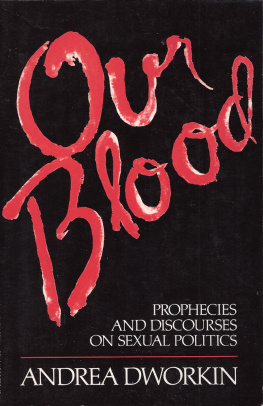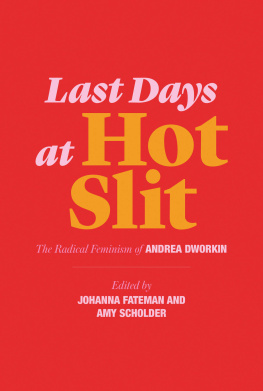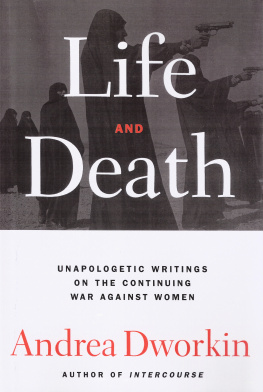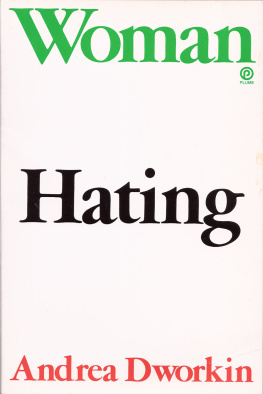Andrea Dworkin - Our Blood: Prophecies and Discourses on Sexual Politics
Here you can read online Andrea Dworkin - Our Blood: Prophecies and Discourses on Sexual Politics full text of the book (entire story) in english for free. Download pdf and epub, get meaning, cover and reviews about this ebook. City: New York, year: 1981, publisher: Perigee Books, genre: Detective and thriller. Description of the work, (preface) as well as reviews are available. Best literature library LitArk.com created for fans of good reading and offers a wide selection of genres:
Romance novel
Science fiction
Adventure
Detective
Science
History
Home and family
Prose
Art
Politics
Computer
Non-fiction
Religion
Business
Children
Humor
Choose a favorite category and find really read worthwhile books. Enjoy immersion in the world of imagination, feel the emotions of the characters or learn something new for yourself, make an fascinating discovery.
- Book:Our Blood: Prophecies and Discourses on Sexual Politics
- Author:
- Publisher:Perigee Books
- Genre:
- Year:1981
- City:New York
- Rating:3 / 5
- Favourites:Add to favourites
- Your mark:
- 60
- 1
- 2
- 3
- 4
- 5
Our Blood: Prophecies and Discourses on Sexual Politics: summary, description and annotation
We offer to read an annotation, description, summary or preface (depends on what the author of the book "Our Blood: Prophecies and Discourses on Sexual Politics" wrote himself). If you haven't found the necessary information about the book — write in the comments, we will try to find it.
Our Blood: Prophecies and Discourses on Sexual Politics — read online for free the complete book (whole text) full work
Below is the text of the book, divided by pages. System saving the place of the last page read, allows you to conveniently read the book "Our Blood: Prophecies and Discourses on Sexual Politics" online for free, without having to search again every time where you left off. Put a bookmark, and you can go to the page where you finished reading at any time.
Font size:
Interval:
Bookmark:
In this fierce and beautiful book, the author ofPornography: Men Possessing Womenconfronts our most profound social disgrace: the sexual, cultural, and political subjugation of women to men, and with rare eloquence examines the systematic crimes of our male-dominated society against women.
Our Bloodis long overdueall women must welcome the vigor and the incisive perception of this young feminist.
Flo Kennedy
Andrea Dworkins writing has the power of young genius
Leah Fritz
Andrea Dworkin has dedicated the title chapter of her book to the Grimke sisters, and it would have pleased them,I thinksince it contains material which can serve at once as source and inspiration for women.
Robin Morgan
Women, looking into the mirror of OutBlood,will feel anguish for our past suffering and enslavementand outrage at our present condition. Men, if they dare to look into this mirror, will turn away in shame and horror at what they have done.
Karla Jay
It is greatscary and innovative and great.
Karen DeCrow
Our Bloodtakes a hard, unflinching look at the nature of sexual politics. Each essay reveals us to ourselves, exposing always the dynamics which have kept women oppressed throughout the ages.Our Bloodcompels us to confront the truth of our lives in the hope that we will then be able to transform them.
Susan Yankowitz

Perigee Books are published by G. P. Putnams Sons 200 Madison Avenue New York, NY 10016
Copyright 1976 by Andrea Dworkin New preface copyright 1981 by Andrea Dworkin All rights reserved. This book, or parts thereof, may not be reproduced in any form without permission.
Published simultaneously in Canada by Academic Press Canada Limited, Toronto.
Feminism, Art, and My Mother Sylvia. *' Copyright Q 1974 by Andrea Dworkin. First published in Social Policy, May/June 1975. Reprinted by permission of the author.
Renouncing Sexual Equality. Copyright 1974 by Andrea Dworkin. First published in WIN, October 17, 1974. Reprinted by permission of the author.
Remembering the Witches. Copyright 1975 by Andrea Dworkin. First published in WIN, February 20, 1975. Reprinted by permission of the author.
The Rape Atrocity and the Boy Next Door. Copyright 1975 by Andrea Dworkin. First delivered as a lecture.
The Sexual Politics of Fear and Courage. Copyright 1975 by Andrea Dworkin. First delivered as a lecture.
Redefining Nonviolence. Copyright 1975 by Andrea Dworkin. Published in WIN, July 17, 1975. Delivered as a lecture under the tide A Call to Separatism. Reprinted by permission of the author.
Lesbian Pride. Copyright 1975 by Andrea Dworkin. First published under the title What Is Lesbian Pride? in The Second Wave, Vol. 4, No. 2, 1975. Delivered as a lecture under the title What Is Lesbian Pride? Reprinted by permission of the author.
Our Blood: The Slavery of Women in Amerika. Copyright 1975 by Andrea Dworkin. First delivered as a lecture under the title Our Blood. The Root Cause. Copyright 1975 by Andrea Dworkin. First delivered as a lecture under the title Androgyny.
Grateful acknowledgment is made to Random House, Inc., for permission to reprint from The Random House Dictionary of the English Language. Copyright 1966, 1967 by Random House, Inc.
Library of Congress Cataloging in Publication Data
Dworkin, Andrea.
Our blood.
Reprint. Originally published: New York: Harper &
Row, cl976.
Bibliography: p.
1. WomenSocial conditions. 2. Feminism. I. Title.
HQ1154. D85 1981 305. 4'2 81-7308 ISBN 0-399-50575-X AACR2
First Perigee printing, 1981
Printed in the United States of America
Contents
Preface
1. Feminism, Art, and My Mother Sylvia
2. Renouncing Sexual Equality
3. Remembering the Witches
4. The Rape Atrocity and the Boy Next Door
5. The Sexual Politics of Fear and Courage
6. Redefining Nonviolence
7. Lesbian Pride
8. Our Blood: The Slavery of Women in Amerika
9. The Root Cause
Notes
FOR BARBARA DEMINGI suggest that if we are willing to confront our own most seemingly personal angers, in their raw state, and take upon ourselves the task of translating this raw anger into the disciplined anger of the search for change, we will find ourselves in a position to speak much more persuasively to comrades about the need to root out from all anger the spirit of murder.Barbara Deming, On Anger
We Cannot Live Without Our Lives
Now, women do not ask half of a kingdom but their rights, and they dont get them. When she comes to demand them, dont you hear how sons hiss their mothers like snakes, because they ask for their rights; and can they ask for anything less?... But well have our rights; see if we dont; and you cant stop us from them; see if you can. You can hiss as much as you like, but it is coming.Sojourner Truth, 1853
ACKNOWLEDGMENTS
I thank Kitty Benedict, Phyllis Chesler, Barbara Deming, Jane Gapen, Beatrice Johnson, Eleanor Johnson, Liz Kanegson, Judah Kataloni, Jeanette Koszuth, Elaine Markson, and Joslyn Pine for their help and faith.I thank John Stoltenberg, who has been my closest intellectual and creative collaborator.I thank my parents, Sylvia and Harry Dworkin, for their continued trust and respect.I thank all of the women who organized the conferences, programs, and classes at which I spoke.I thank those feminist philosophers, writers, organizers, and prophets whose work sustains and strengthens me.PREFACE
Our Blood is a book that grew out of a situation. The situation was that I could not get my work published. So I took to public speakingnot the extemporaneous exposition of thoughts or the outpouring of feelings, but crafted prose that would inform, persuade, disturb, cause recognition, sanction rage. I told myself that if publishers would not publish my work, I would bypass them altogether. I decided to write directly to people and for my own voice. I started writing this way because I had no other choice: I saw no other way to survive as a writer. I was convinced that it was the publishing establishmenttimid and powerless women editors, the superstructure of men who make the real decisions, misogynistic reviewersthat stood between me and a public particularly of women that I knew was there. The publishing establishment was a formidable blockade, and my plan was to swim around it.
In April 1974 my first book-length work of feminist theory,Woman Hating,was published. Before its publication I had had trouble. I had been offered magazine assignments that were disgusting. I had been offered a great deal of money to write articles that an editor had already outlined to me in detail. They were to be about women or sex or drugs. They were stupid and full of lies. For instance, I was offered $1500 to write an article on the use of barbiturates and amphetamines by suburban women. I was to say that this use of drugs constituted a hedonistic rebellion against the dull conventions of sterile housewifery, that women used these drugs to turn on and swing and have a wonderful new life-style. I told the editor that I suspected women used amphetamines to get through miserable days and barbiturates to get through miserable nights. I suggested, amiably I thought, that I ask the women who use the drugs why they use them. I was told flat-out that the articlewould saywhat fun it was. I turned down the assignment. This sounds like great rebellious funtelling establishment types to go fuck themselves with their fistful of dollarsbut when one is very poor, as I was, it is not fun. It is instead profoundly distressing. Six years later I finally made half that amount for a magazine piece, the highest I have ever been paid for an article. I had had my chance to play ball and I had refused. I was too naive to know that hack writing is the only paying game in town. I believed in literature, principles, politics, and the power of fine writing to change lives. When I refused to do that article and others, I did so with considerable indignation. The indignation marked me as a wild woman, a bitch, a reputation reinforced during editorial fights over the content ofWoman Hating,a reputation that has haunted and hurt me: not hurt my feelings, but hurt my ability to make a living. I am in fact not a lady, not a lady writer, not a sweet young thing. What woman is? My ethics, my politics, and my style merged to make me an untouchable. Girls are supposed to be invitingly touchable, on the surface or just under.
Next pageFont size:
Interval:
Bookmark:
Similar books «Our Blood: Prophecies and Discourses on Sexual Politics»
Look at similar books to Our Blood: Prophecies and Discourses on Sexual Politics. We have selected literature similar in name and meaning in the hope of providing readers with more options to find new, interesting, not yet read works.
Discussion, reviews of the book Our Blood: Prophecies and Discourses on Sexual Politics and just readers' own opinions. Leave your comments, write what you think about the work, its meaning or the main characters. Specify what exactly you liked and what you didn't like, and why you think so.





